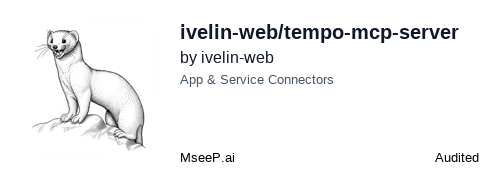About
A Model Context Protocol server that manages Tempo worklogs within Jira. It exposes Tempo and Jira API endpoints for retrieving, creating, editing, bulk‑creating, and deleting worklogs, making time tracking accessible through Claude, Cursor, and other MCP clients.
Capabilities

The Tempo MCP Server bridges the gap between AI assistants and Jira’s Tempo time‑tracking ecosystem. By exposing a Model Context Protocol interface, it lets Claude, Cursor, and any MCP‑compatible client query, create, edit, or delete Tempo worklogs without leaving the conversational flow. This eliminates the need for developers to write custom integrations or manually navigate Jira’s UI, thereby accelerating productivity and reducing friction when managing time entries in real time.
At its core, the server translates MCP tool calls into authenticated requests against Tempo’s REST API. Developers configure simple environment variables for Tempo and Jira tokens, then add a single MCP server entry to their client configuration. Once connected, the assistant can retrieve all worklogs for a specified date range, add new logs to any issue, bulk‑create multiple entries in one request, modify existing logs, or delete them entirely. These capabilities are exposed through a clean set of tools that the AI can invoke via natural language, enabling workflows such as “Log 2 hours on issue ABC‑123 for yesterday” or “Show me all worklogs from last week.”
Key features include:
- Unified time‑tracking interface: All Tempo worklog operations are available through a single MCP server, eliminating the need for separate tools or manual API calls.
- Bulk operations: Create dozens of worklogs in one operation, saving time for developers who need to record large amounts of activity quickly.
- Edit and delete support: The assistant can correct mistakes or remove stale entries, ensuring data integrity without manual intervention.
- Easy integration: The server can be launched via or run locally, making it accessible to both casual users and developers who wish to extend functionality.
Typical use cases span from agile sprint planning—where a developer can ask the assistant to log time against multiple issues—to compliance reporting, where auditors might request a summary of all worklogs for a period. In continuous integration pipelines, the server can automatically log build or test time against relevant tickets, keeping records up to date without human input.
Because it adheres to the MCP specification, the Tempo server can be plugged into any AI workflow that supports context‑aware tool execution. This modularity means teams can add Tempo time‑tracking to existing Claude or Cursor setups with minimal effort, while still benefiting from the rich conversational context that MCP provides. The result is a seamless, AI‑driven experience for managing worklogs directly from the chat interface.
Related Servers
n8n
Self‑hosted, code‑first workflow automation platform
FastMCP
TypeScript framework for rapid MCP server development
Activepieces
Open-source AI automation platform for building and deploying extensible workflows
MaxKB
Enterprise‑grade AI agent platform with RAG and workflow orchestration.
Filestash
Web‑based file manager for any storage backend
MCP for Beginners
Learn Model Context Protocol with hands‑on examples
Weekly Views
Server Health
Information
Explore More Servers
Symbol Blockchain MCP Server
Bridge Symbol blockchain REST API to Model Context Protocol tools
Shield MCP
Secure and monitor Model Context Protocol calls effortlessly
Unstructured API MCP Server
Connect, manage, and run Unstructured workflows effortlessly
Boost.space MCP Server
Proxy for Boost.Space API via Model Context Protocol
MCP Code Runner
Run code via MCP using Docker containers
CVDLT MCP Server
AI vision server for detection, segmentation and pose estimation